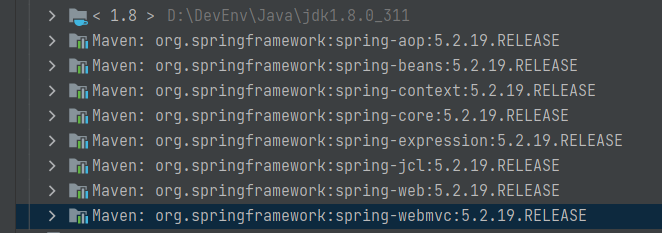因为使用的maven,web容器使用的tomcat,所以先在pom.xml中加上:
<packaging>war</packaging>
这样项目就会自动将依赖放进WEB-INF下面的lib中,否则会出现一系列NoClassFound等错误。
添加spring-webmvc依赖:
<dependency>
<groupId>org.springframework</groupId>
<artifactId>spring-webmvc</artifactId>
<version>${spring.version}</version>
</dependency>
<!-- 方便查看源码 -->
<dependency>
<groupId>javax.servlet</groupId>
<artifactId>javax.servlet-api</artifactId>
<version>4.0.1</version>
</dependency>
只添加一个spring-webmvc就够了

可以看到已经将相关依赖全部加载进去了。
这里有一个问题,@Contoller和@GetMapping等注解是在spring-web中,然而只有这两个注解,不去配置DispatcherServlet是不会处理请求的,也就是说如果只导入spring-web依赖,而没有spring-webmvc,即使有@Controller,也只是个普通的注解。
在web.xml中配置
<listener>
<listener-class>org.springframework.web.context.ContextLoaderListener</listener-class>
</listener>
<!-- 采用注解方式配置 -->
<context-param>
<param-name>contextClass</param-name>
<param-value>
<!-- 使用注解实现类 -->
org.springframework.web.context.support.AnnotationConfigWebApplicationContext
</param-value>
</context-param>
<context-param>
<param-name>contextConfigLocation</param-name>
<!-- 配置类 -->
<param-value>com.sk.day31.config.ApplicationConfig</param-value>
</context-param>
ContextLoaderListener实现了ServletContextListener接口,ServletContextListener在文档中的解释是
该接口的实现可以接收关于它们所处的Web应用程序的Servlet上下文变化的通知。为了接收通知事件,必须在Web应用程序的部署描述符中配置该实现类。
ServletContextListener 是 Java EE 标准接口之一,类似 Jetty,Tomcat,JBoss 等 java 容器启动时便会触发该接口的 contextInitialized。
spring加载流程- 在Web容器启动后,触发ContextLoaderListener,contextInitialized方法被调用,接着调用initWebApplicationContext方法,并将ServletContext当作参数传入
@Override
public void contextInitialized(ServletContextEvent event) {
initWebApplicationContext(event.getServletContext());
}
- 进入initWebApplicationContext方法后,调用createWebApplicationContext
public WebApplicationContext initWebApplicationContext(ServletContext servletContext) {
...
try {
// Store context in local instance variable, to guarantee that
// it is available on ServletContext shutdown.
if (this.context == null) {
this.context = createWebApplicationContext(servletContext);
}
...
}
- 进入createWebApplicationContext方法, 源码如下:
protected WebApplicationContext createWebApplicationContext(ServletContext sc) {
Class<?> contextClass = determineContextClass(sc);
if (!ConfigurableWebApplicationContext.class.isAssignableFrom(contextClass)) {
throw new ApplicationContextException("Custom context class [" + contextClass.getName() +
"] is not of type [" + ConfigurableWebApplicationContext.class.getName() + "]");
}
return (ConfigurableWebApplicationContext) BeanUtils.instantiateClass(contextClass);
}
determineContextClass用来返回一个实现了WebApplicationContext接口的类:
protected Class<?> determineContextClass(ServletContext servletContext) {
String contextClassName = servletContext.getInitParameter(CONTEXT_CLASS_PARAM);
if (contextClassName != null) {
try {
return ClassUtils.forName(contextClassName, ClassUtils.getDefaultClassLoader());
}
catch (ClassNotFoundException ex) {
throw new ApplicationContextException(
"Failed to load custom context class [" + contextClassName + "]", ex);
}
}
else {
contextClassName = defaultStrategies.getProperty(WebApplicationContext.class.getName());
try {
return ClassUtils.forName(contextClassName, ContextLoader.class.getClassLoader());
}
catch (ClassNotFoundException ex) {
throw new ApplicationContextException(
"Failed to load default context class [" + contextClassName + "]", ex);
}
}
}
determineContextClass根据web.xml中定义的contextClass,来决定返回的实现类,如果没有配置,则返回默认的XmlWebApplicationContext,最后通过BeanUtils.instantiateClass(contextClass)创建对象。
那么就出现一个问题,XmlWebApplicationContext是什么?
首先要先讲一下BeanFactory,根据官方文档,BeanFactory接口提供了一个高级配置机制,能够管理任何类型的对象。简单来说就是Spring的容器,用来管理各种Bean。
import org.springframework.beans.factory.InitializingBean;
import org.springframework.beans.factory.xml.XmlBeanFactory;
import org.springframework.core.io.ClassPathResource;
public class MainApp {
public static void main(String[] args) {
XmlBeanFactory factory = new XmlBeanFactory(new ClassPathResource("Beans.xml"));
HelloWorld obj = (HelloWorld) factory.getBean("helloWorld");
obj.getMessage();
}
}
上述例子就是用了BeanFactory的其中一个实现类XmlBeanFactory来创建Bean。
而ApplicationContext是BeanFactory的扩展,提供了更多的功能,例如:
- 用于访问应用程序组件的Bean工厂方法。从ListableBeanFactory继承而来。
- 以通用方式加载文件资源的能力。从ResourceLoader接口继承而来。
- 向注册的听众发布事件的能力。从ApplicationEventPublisher接口继承而来。
- 解决消息的能力,支持国际化。继承自MessageSource接口。
ApplicationContext常用的实现类有ClassPathXmlApplicationContext,以及上面提到的WebApplicationContext,这些实现类相当于特化,比如ClassPathXmlApplicationContext就是从类路径中获取配置文件:
public class TestSpring {
@Test
public void test(){
ApplicationContext context=new ClassPathXmlApplicationContext("applicationContext.xml");
Hello hello=(Hello)context.getBean("helloWorld");
hello.say();
}
}
WebApplicationContext是专门为web应用准备的,它允许从相对于Web根目录的路径中装载资源配置文件完成初始化工作。而WebApplicationContext最常用的实现类也就是上面的XmlWebApplicationContext了,此实现类会默认从WEB-INF的目录下读取applicationContext.xml来创建容器,当然这个路径也可以自定义。
- 再回到前面,determineContextClass返回了XmlWebApplicationContext类,并实例化,将其强转为ConfigurableWebApplicationContext,并执行configureAndRefreshWebApplicationContext
if (this.context instanceof ConfigurableWebApplicationContext) {
ConfigurableWebApplicationContext cwac = (ConfigurableWebApplicationContext) this.context;
if (!cwac.isActive()) {
...
configureAndRefreshWebApplicationContext(cwac, servletContext);
}
}
- 进入configureAndRefreshWebApplicationContext方法,通过ServletContext获取web.xml中的contextConfigLocation值,设置到XmlWebApplicationContext中。
String configLocationParam = sc.getInitParameter(CONFIG_LOCATION_PARAM);
if (configLocationParam != null) {
wac.setConfigLocation(configLocationParam);
}
...
wac.refresh();
- 执行refresh方法
public void refresh() throws BeansException, IllegalStateException {
Object var1 = this.startupShutdownMonitor;
synchronized(this.startupShutdownMonitor) {
//容器预先准备,记录容器启动时间和标记
prepareRefresh();
//创建bean工厂,里面实现了BeanDefinition的装载
ConfigurableListableBeanFactory beanFactory = obtainFreshBeanFactory();
//配置bean工厂的上下文信息,如类装载器等
prepareBeanFactory(beanFactory);
try {
//在BeanDefinition被装载后,提供一个修改BeanFactory的入口
postProcessBeanFactory(beanFactory);
//在bean初始化之前,提供对BeanDefinition修改入口,PropertyPlaceholderConfigurer在这里被调用
invokeBeanFactoryPostProcessors(beanFactory);
//注册各种BeanPostProcessors,用于在bean被初始化时进行拦截,进行额外初始化操作
registerBeanPostProcessors(beanFactory);
//初始化MessageSource
initMessageSource();
//初始化上下文事件广播
initApplicationEventMulticaster();
//模板方法
onRefresh();
//注册监听器
registerListeners();
//初始化所有未初始化的非懒加载的单例Bean
finishBeanFactoryInitialization(beanFactory);
//发布事件通知
finishRefresh();
} catch (BeansException var5) {
if(this.logger.isWarnEnabled()) {
this.logger.warn("Exception encountered during context initialization - cancelling refresh attempt: " + var5);
}
this.destroyBeans();
this.cancelRefresh(var5);
throw var5;
}
}
}
完成bean的加载。
JavaConfig方式配置ApplicationConfig@Configuration
@ComponentScan(basePackages = "com.sk.day31", excludeFilters = {@ComponentScan.Filter(type = FilterType.ANNOTATION, classes = Controller.class)})
public class ApplicationConfig {
}
效果类似
<context:component-scan base-package="com.sk.day31">
<context:exclude-filter type="annotation" expression="org.springframework.stereotype.Controller"/>-->
</context:component-scan>
在web.xml中配置:
<servlet>
<servlet-name>dispatcherServlet</servlet-name>
<servlet-class>org.springframework.web.servlet.DispatcherServlet</servlet-class>
<init-param>
<param-name>contextClass</param-name>
<param-value>
<!-- 使用注解实现类 -->
org.springframework.web.context.support.AnnotationConfigWebApplicationContext
</param-value>
</init-param>
<init-param>
<param-name>contextConfigLocation</param-name>
<param-value>com.sk.day31.config.SpringMvcConfig</param-value>
</init-param>
<load-on-startup>1</load-on-startup>
</servlet>
<servlet-mapping>
<servlet-name>dispatcherServlet</servlet-name>
<url-pattern>/</url-pattern>
</servlet-mapping>
@Configuration
@ComponentScan(basePackages = "com.sk.day31.controller")
@EnableWebMvc
public class SpringMvcConfig implements WebMvcConfigurer {
@Override
public void addResourceHandlers(ResourceHandlerRegistry registry) {
registry.addResourceHandler("/resources/**")
.addResourceLocations("classpath:/static/")
.setCacheControl(CacheControl.maxAge(Duration.ofDays(365)));
}
@Override
public void configureDefaultServletHandling(DefaultServletHandlerConfigurer configurer) {
configurer.enable();
}
}
@EnableWebMvc效果等于mvc:annotation-driven/。
configureDefaultServletHandling方法作用等于mvc:default-servlet-handler/
<dependency>
<groupId>org.springframework</groupId>
<artifactId>spring-jdbc</artifactId>
<version>${spring.version}</version>
</dependency>
<dependency>
<groupId>mysql</groupId>
<artifactId>mysql-connector-java</artifactId>
<version>8.0.28</version>
</dependency>
<dependency>
<groupId>com.alibaba</groupId>
<artifactId>druid</artifactId>
<version>1.1.22</version>
</dependency>
<dependency>
<groupId>org.mybatis</groupId>
<artifactId>mybatis-spring</artifactId>
<version>2.0.7</version>
</dependency>
<dependency>
<groupId>org.mybatis</groupId>
<artifactId>mybatis</artifactId>
<version>3.5.9</version>
</dependency>
spring-jdbc必须添加,不然会报错java.lang.NoClassDefFoundError: org/springframework/dao/support/DaoSupport。
配置类@Configuration
@PropertySource("classpath:druid.properties")
@MapperScan(basePackages = "com.sk.day31.mapper")
public class MybatisConfig {
@Value("${jdbc.driver}")
private String driver;
@Value("${jdbc.url}")
private String url;
@Value("${jdbc.username}")
private String username;
@Value("${jdbc.password}")
private String password;
@Bean
public DruidDataSource dataSource(){
DruidDataSource dataSource=new DruidDataSource();
dataSource.setDriverClassName(driver);
dataSource.setUrl(url);
dataSource.setUsername(username);
dataSource.setPassword(password);
return dataSource;
}
@Bean
public SqlSessionFactory sqlSessionFactory() throws Exception {
SqlSessionFactoryBean factoryBean = new SqlSessionFactoryBean();
factoryBean.setTypeAliasesPackage("com.sk.day31.entity");
factoryBean.setMapperLocations(new PathMatchingResourcePatternResolver().getResources("classpath:mapper/*.xml"));
factoryBean.setDataSource(dataSource());
return factoryBean.getObject();
}
}
到此就算是整合完毕了
